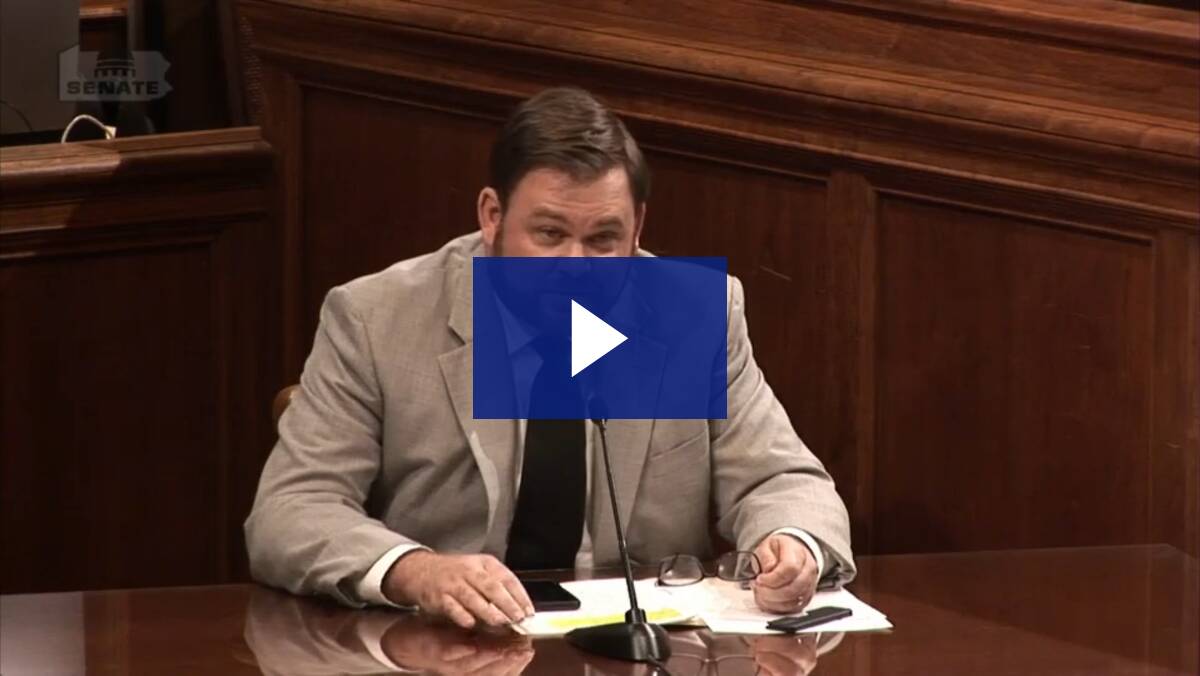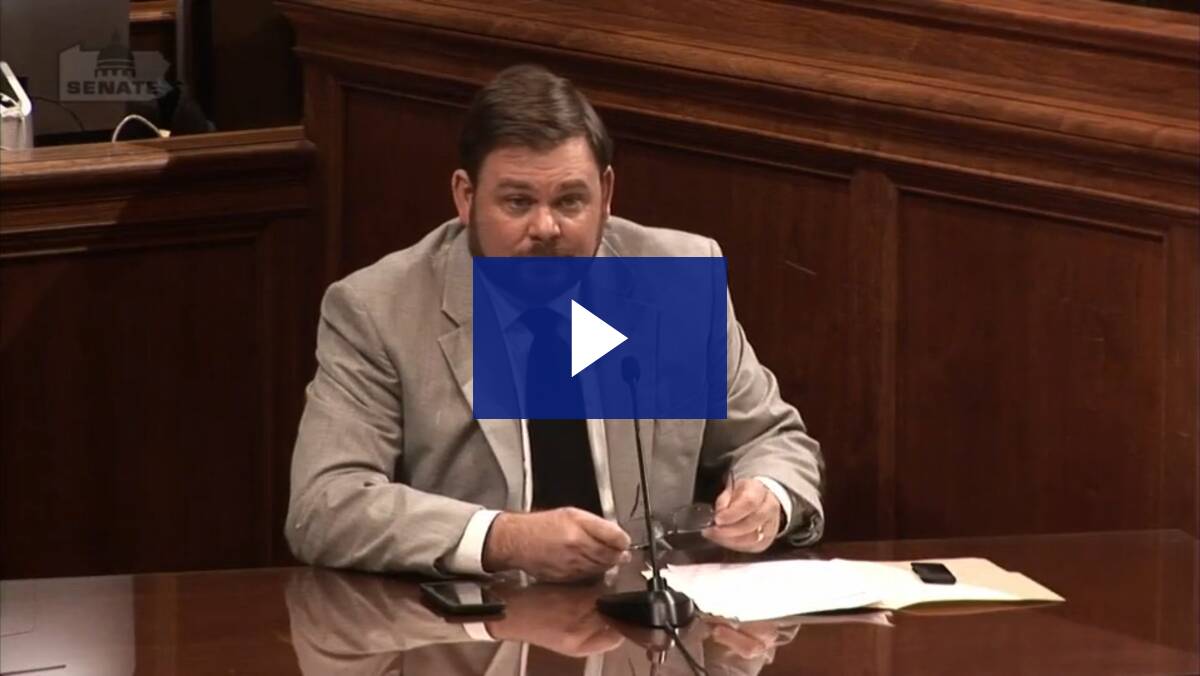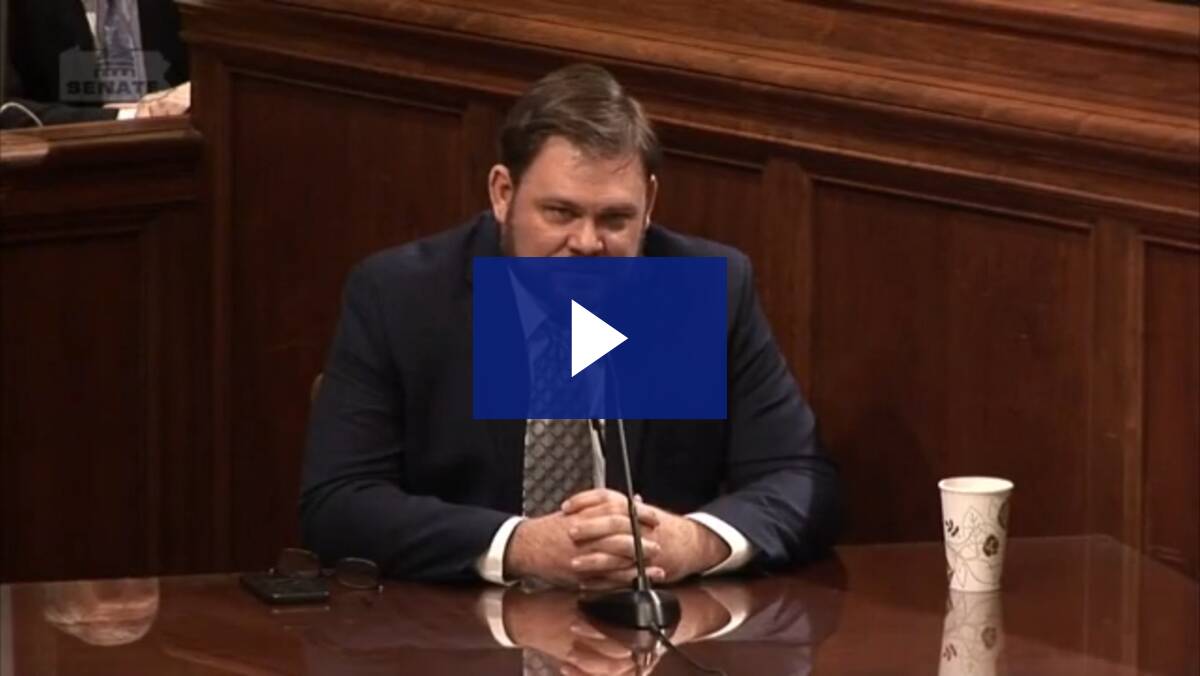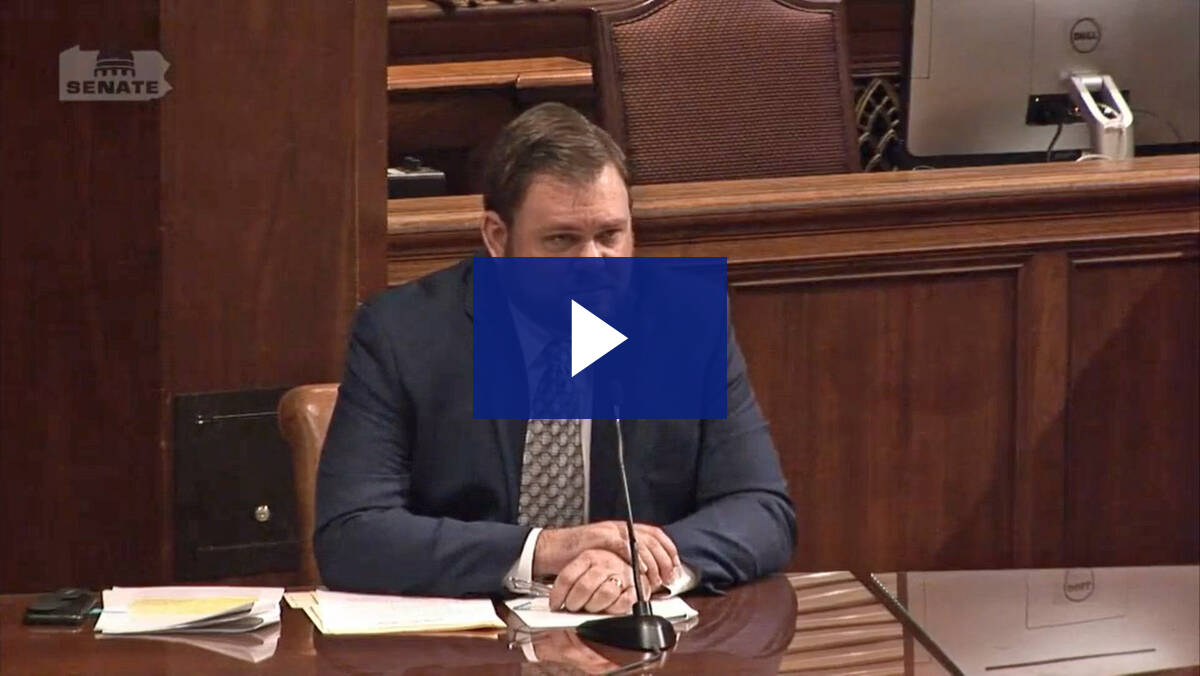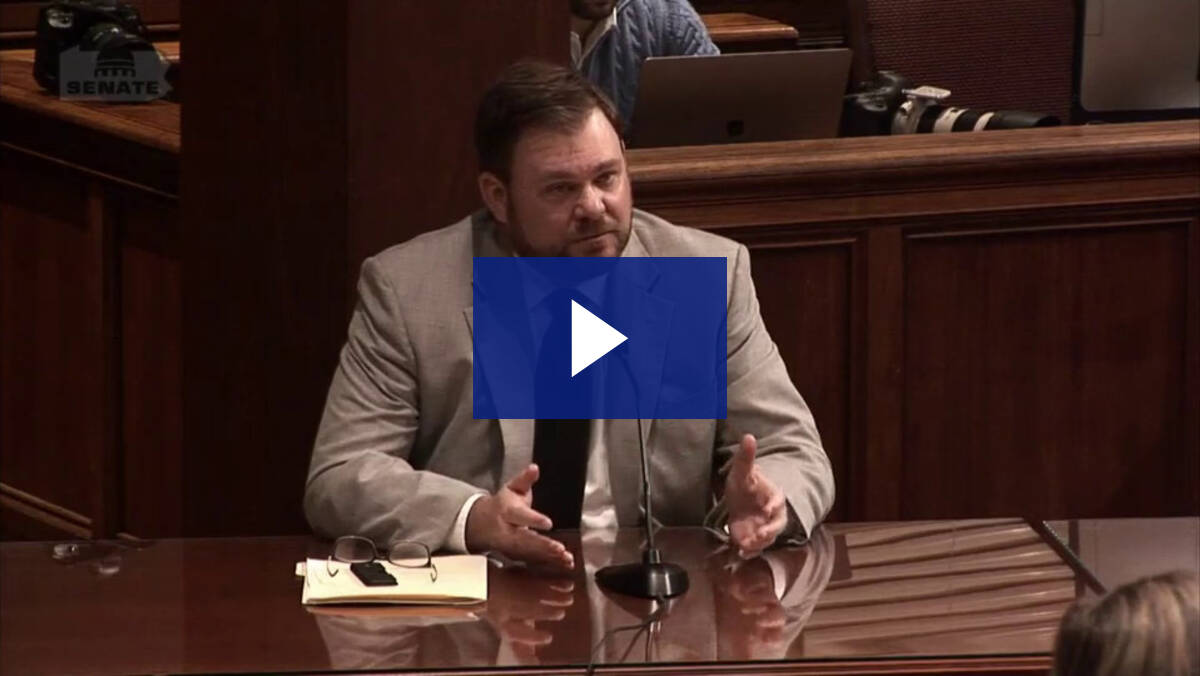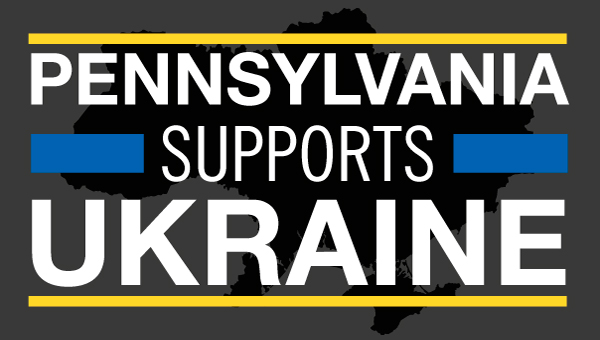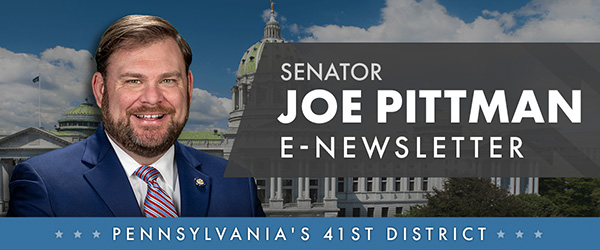
|
||||
|
In this Update:
Senate Hearings on Proposed State Budget: Week Two
The Senate Appropriations Committee continued public hearings this week on the proposed 2022-23 state budget. Gov. Tom Wolf proposed a $45.7 billion budget that would increase spending by $4.5 billion. Based on projections, this will create a $1.3 billion deficit in the following fiscal year and produce a $13 billion deficit by 2026-27. During this week’s hearing for the state Department of Environmental Protection (DEP), I pressed the department about the limitations of public hearings on the Regional Greenhouse Gas Initiative (RGGI) and how it will spend the $410 million raised from an electricity tax ultimately paid by Pennsylvania residents. During my follow-up questioning of the DEP, I clarified whether a new governor could remove us from RGGI in the same way Gov. Wolf forced us into it. RGGI and its severe impact on many Pennsylvania communities, along with how a minimum wage hike would negatively affect consumer costs, social services providers and the hospitality industry were questions I raised earlier this week with the Department of Community and Economic Development. I also queried state Attorney General Josh Shapiro this week about his past statements expressing concern about the process used by Gov. Wolf to impose RGGI on Pennsylvania workers and electricity ratepayers. Lastly, during the budget hearing for the Department of Conservation and Natural Resources (DCNR), I discussed the importance of leveraging existing DCNR assets to fix infrastructure issues, such as the massive water leaks at Yellow Creek State Park in Indiana County. You can find information on other budget hearings, hearing video, livestreams and more at PASenateGOP.com. Pennsylvania Acts to Support Ukraine
Pennsylvania has the second-largest population of Ukrainian Americans in the nation, with more than 122,000. Pennsylvania government is planning several responses to Russia’s invasion of Ukraine in order to deny funds to Russia and show solidarity with Ukrainians. Treasurer Stacy Garrity said the Treasury had started to divest its holdings in Russian-based companies. The Pennsylvania School Employees’ Retirement System is gathering details about its exposure to Russian-related investments and could divest in a few weeks. In addition, the Pennsylvania Liquor Control Board is reviewing its inventory and is expected to stop selling vodka made in Russia. To keep Russia in check in the long term, we must reassert America’s energy independence. Increasing domestic energy production and exports to European countries will go a long way toward reducing Russian influence and denying the regime the funds it needs to make war. That’s why last week Sen. Wayne Langerholc, Jr. (R-35), Sen. Gene Yaw (R-23) and I announced our intention to introduce a resolution urging President Biden to restart the Keystone XL Pipeline. For too long we have been distracted from the pressing dangers throughout the world by voices whose policies have given a strategic advantage to autocrats who have no concern for human life, only their own collection of power and wealth. The Keystone XL pipeline is critical to our national energy infrastructure and it’s also very symbolic of a desire to secure our energy independence for not only economic interests but national security interests. COVID Relief Funds Remain Available Through Indiana County CARES Act Revolving Loan FundFunds remain available through Indiana County’s CARES Act Revolving Loan Fund for businesses still in need of some relief from COVID-related expenses. Through the program, administered by the Indiana County Office of Planning and Development (ICOPD), businesses can receive up to $50,000 to pay for working capital, like payroll, fringe benefits, utilities and rent, though the loaned funds cannot be used to pay the same expenses for which the business received other COVID-19 funds. Borrowers must commit to retaining existing jobs. The loans are interest free for the entire 72-month term of the loan. Additionally, during the first 12 months there are no charges for principal payments, to be followed by principal payments being due for the remaining 60 months. An application form is available on the ICOPD website. Assistance for Home Septic Repairs, Sewer Hook-ups
Low-interest loans are available to eligible Pennsylvania homeowners who need to repair or replace their on-lot septic system or connect to a public sewer. The assistance can help homeowners avoid or respond to municipal citations and improve the environmental health of their property. Loan terms are up to 20 years (up to 15 years for manufactured homes). There is no prepayment penalty if the loan is paid off early. The maximum loan amount is $25,000. The program is administered by the Pennsylvania Infrastructure Investment Authority, Pennsylvania Housing Finance Agency and Pennsylvania Department of Environmental Protection. You can find more information and terms here. PA ABLE Helps Families Save for Disability-Related Expenses
In 2016, the General Assembly passed the Achieving a Better Life Experience (ABLE) Act and created PA ABLE accounts that give individuals with qualified disabilities, their families and friends a tax-free way to save for disability-related expenses, while maintaining government benefits. Administered by the Pennsylvania Treasury, the accounts allow people with disabilities and their families the opportunity to save up to $100,000, without affecting eligibility for important government benefits, such as Supplemental Security Income or Medicaid. The withdrawals from the accounts for qualified expenses related to an individual’s disabilities are also considered exempt from federal and state taxes, and the accounts are not subject to Pennsylvania’s inheritance tax. To learn more about how you might be able to save money with the program, the Pennsylvania Treasury is hosting free webinars, with the next one for individuals with disabilities, families and professionals scheduled for Tuesday, April 19 from 6-7 p.m. Disabled Veteran Real Estate Tax Exemption
Pennsylvania veterans with a financial need who served during a period of war and are 100% disabled could benefit from a state real estate tax exemption program. An applicant whose gross annual income exceeds $95,279 will be considered to have a financial need for the exemption if allowable expenses exceed household income. You can find details about eligibility here. Contact your local County Veterans Affairs Director to apply for this program. The PA Senate Guest Chaplain ProgramThe Pennsylvania Senate through its Guest Chaplain Program offers an opportunity for clergy of all faiths from across the commonwealth to come to the state Capitol to open a Senate session with prayer. Clergy and their guests get to meet with their senator, have pictures taken with them on the Senate floor and will be given a link to circulate to friends and family of them delivering prayer. If clergy within the 41st Senatorial District are interested in participating in this program, please contact one of my legislative offices as soon as possible. |
||||
|
||||




2024 © Senate of Pennsylvania | https://senatorpittman.com | Privacy Policy |

